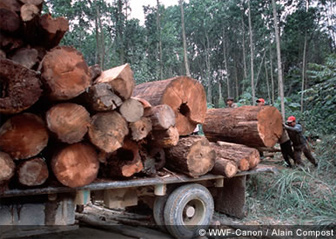$100 billion worth of carbon released from deforestation in Riau, Sumatra
$100 billion worth of carbon released from deforestation in Riau, Sumatra
mongabay.com
February 28, 2008
A WWF study found that deforestation of nearly 10.5 million acres of tropical forests and peat swamp in central Sumatra’s Riau Province over the past 25 years has generated 3.7 gigatons of carbon dioxide. Based on today’s $32 closing price for a ton of carbon dioxide for European Union Allowances, the emissions had a theoretical trading value of $118 billion, assuming they could have been traded at the full E.U. carbon price at the time (voluntary offsets would have been worth about $13 billion).
WWF says the emissions are equivalent to 122 percent of the Netherlands’ total annual emissions, 58 percent of Australia’s annual emissions, 39 percent of annual UK emissions and 26 percent of annual German emissions.
The group says forest clearing in Riau was driven by paper giants Asia Pulp & Paper (APP) and Asia Pacific Resources International Holdings Limited (APRIL). It estimates that about two-thirds of the forest cover in the province has been cleared over the past 25 years.

|
“The loss of Sumatra’s carbon-rich forest ecosystems is not just Indonesia’s problem — this affects the environmental health of the entire planet,” said Adam Tomasek, managing director of the Borneo and Sumatra program at WWF-US. “This groundbreaking report gives U.S. businesses a roadmap for getting the biggest bang for their buck. An investment in Riau Province would both protect some of the world’s largest carbon stores and safeguard endangered tigers, elephants and local communities.”
WWF says there has been an 84 percent decline in elephant populations and a 70 percent in the number of Sumatran tigers since 1982.
“WWF is alarmed that the loss of forests is taking such a high toll not only on the remaining wild elephants and tigers in Sumatra but also on global climate change,” said Dr Sybille Klenzendorf, director of species conservation at WWF-US. “The message is clear — the world must commit to solutions that can save these forests if we are to significantly slow the rate of climate change and allow nature and people to flourish in Sumatra.”
Deforestation, forest degradation, biodiversity loss and CO2 emissions in Riau, Sumatra, Indonesia (PDF)
Related articles
First rainforest-for-carbon-credits deal becomes a reality
(2/7/2008) Villagers in Aceh, the Indonesian province that suffered through three decades of civil war and lost some 170,000 people to the 2004 Indian Ocean tsunami, could soon see $26 million in carbon credits for protecting rainforests from logging under a deal announced today between conservationists, carbon traders, and the Aceh government.
Paper giant illegally destroying orangutan habitat in Indonesia says WWF
(1/9/2008) In a report released Monday, environmental group WWF has accused forestry giant Asia Pulp and Paper (APP) of illegally logging endangered orangutan habitat on the island of Sumatra.
10% of global CO2 emissions result from swamp destruction
(12/10/2007) More than 10 percent of annual carbon dioxide emissions result from the degradation and destruction of peat swamps, reports the first comprehensive global assessment on the links between peatland degradation and climate change.
Is the oil-palm industry using global warming to mislead the public?
(11/23/2007) Members of the Indonesian Palm Oil Commission are distributing materials that misrepresent the carbon balance of oil-palm plantations, according to accounts from people who have seen presentations by commission members. These officials are apparently arguing that oil-palm plantations store and sequester many times the amount of CO2 as natural forests, and therefore that converting forests for plantations is the best way to fight climate change. In making such claims, these Indonesian representatives evidently are ignoring data that show the opposite, putting the credibility of the oil-palm industry at risk, and undermining efforts to slow deforestation and rein in greenhouse gas emissions.
Greenwashing the palm oil industry
(11/12/2007) A new report from Greenpeace alleges that members of the Roundtable on Sustainable Palm Oil — an industry-driven initiative to clean up palm oil production — are using palm oil derived by clearing endangered rainforests and draining carbon-rich peatlands on the Indonesian island of Sumatra.
WSJ inquiry pushes FSC to cancel logging certification in endangered forest
(10/30/2007) An inquiry by The Wall Street Journal prompted the Forest Stewardship Council (FSC), an environmental body that runs a widely accepted “green” labeling system for forestry products, to revoke certification for a Singapore-based Asia Pulp & Paper Co. (APP) project on the Indonesian island of Sumatra.
Indonesia’s peatlands may offer U.S. firms global warming offsets
(8/29/2007) The following is modified version of a letter I’ve used to pitch U.S. companies on the concept of carbon finance in Indonesia’s peatlands. Discussions are slow and the critical December U.N. climate meeting is fast approaching, so I’m posting this as a tool to help you get American firms interested in avoided deforestation offsets. Please feel free to use, modify, and distribute this letter widely.
Could peatlands conservation be more profitable than palm oil?
(8/22/2007) This past June, World Bank published a report warning that climate change presents serious risks to Indonesia, including the possibility of losing 2,000 islands as sea levels rise. While this scenario is dire, proposed mechanisms for addressing climate change, notably carbon credits through avoided deforestation, offer a unique opportunity for Indonesia to strengthen its economy while demonstrating worldwide innovative political and environmental leadership. In a July 29th editorial we argued that in some cases, preserving ecosystems for carbon credits could be more valuable than conversion for oil palm plantations, providing higher tax revenue for the Indonesian treasury while at the same time offering attractive economic returns for investors.














